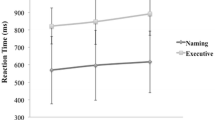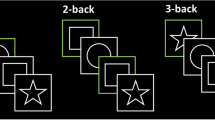Abstract
Reviews on cardiovascular fitness and cognition in older adults suggest that a higher level of cardiorespiratory fitness may protect the brain against the effects of aging. Although studies reveal positive effects of cardiorespiratory fitness on executive function, more research is needed to clarify the underlying mechanisms of these effects in older adults. The aim of the current study was to assess the association between cardiorespiratory fitness level, cerebral oxygenation, and cognitive performance in older adults (OAs). Seventy-four OAs (68 ± 6.3 years) gave their written, informed consent to participate in the study. Complete data was collected from 66 participants. All participants underwent a cycle ergometer maximal continuous graded exercise test in order to assess their peak power output (PPO) and a neuropsychological paper and pencil tests (Trail Making Test A and B) while changes in left prefrontal cortex oxygenation were measured with functional near-infrared spectroscopy (fNIRS). The results reveal increased cardiorespiratory fitness was associated with decreased response time (i.e., better performance) on the Trail Making Test (B) (standardized β = − 0.42, p < 0.05). Cerebral oxygenation in higher fit older adults mediated the relationship with improved executive functioning (standardized β = − 0.08, p < 0.05). Specifically, in older adults with higher cardiorespiratory fitness (based on a median split), cerebral oxygenation was related to executive functioning but no such relationship existed in lower fit adults.



Similar content being viewed by others
References
Angevaren M, Aufdemkampe G, Verhaar HJ, Aleman A, Vanhees L (2008) Physical activity and enhanced fitness to improve cognitive function in older people without known cognitive impairment. Cochrane Database Syst Rev 3:CD005381
Bailey DM, Marley CJ, Brugniaux JV, Hodson D, New KJ, Ogoh S, Ainslie PN (2013) Elevated aerobic fitness sustained throughout the adult lifespan is associated with improved cerebral hemodynamics. Stroke 44(11):3235–3238
Bherer L, Erickson KI, Liu-Ambrose T (2013) A review of the effects of physical activity and exercise on cognitive and brain functions in older adults. J Aging Res 2013:657508
Bishop NA, Lu T, Yankner BA (2010) Neural mechanisms of ageing and cognitive decline. Nature 464(7288):529–535
Bossers WJ, van der Woude LH, Boersma F, Hortobagyi T, Scherder EJ, van Heuvelen MJ (2015) A 9-week aerobic and strength training program improves cognitive and motor function in patients with dementia: a randomized, controlled trial. Am J Geriatr Psychiatry 23(11):1106–1116
Boucard GK, Albinet CT, Bugaiska A, Bouquet CA, Clarys D, Audiffren M (2012) Impact of physical activity on executive functions in aging: a selective effect on inhibition among old adults. J Sport Exerc Psychol 34(6):808–827
Cabeza R (2002) Hemispheric asymmetry reduction in older adults: the HAROLD model. Psychol Aging 17(1):85–100
Churchill JD, Galvez R, Colcombe S, Swain RA, Kramer AF, Greenough WT (2002) Exercise, experience and the aging brain. Neurobiol Aging 23(5):941–955
Colcombe S, Kramer AF (2003) Fitness effects on the cognitive function of older adults: a meta-analysis study. Psychol Sci 14(2):125–130
Colcombe SJ, Kramer AF, Erickson KI, Scalf P, McAuley E, Cohen NJ, Webb A, Jerome GJ, Marquez DX, Elavsky S (2004) Cardiovascular fitness, cortical plasticity, and aging. Proc Natl Acad Sci U S A 101(9):3316–3321
Davenport MH, Hogan DB, Eskes GA, Longman RS, Poulin MJ (2012) Cerebrovascular reserve: the link between fitness and cognitive function? Exerc Sport Sci Rev 40(3):153–158
Dupuy O, Gauthier CJ, Fraser SA, Desjardins-Crepeau L, Desjardins M, Mekary S, Lesage F, Hoge RD, Pouliot P, Bherer L (2015) Higher levels of cardiovascular fitness are associated with better executive function and prefrontal oxygenation in younger and older women. Front Hum Neurosci 9:66
Dustman RE, Emmerson RY, Ruhling RO, Shearer DE, Steinhaus LA, Johnson SC, Bonekat HW, Shigeoka JW (1990) Age and fitness effects on EEG, ERPs, visual sensitivity, and cognition. Neurobiol Aging 11(3):193–200
Ekkekakis P (2009) Illuminating the black box: investigating prefrontal cortical hemodynamics during exercise with near-infrared spectroscopy. J Sport Exerc Psychol 31(4):505–553
Erickson KI, Prakash RS, Voss MW, Chaddock L, Hu L, Morris KS, White SM, Wojcicki TR, McAuley E, Kramer AF (2009) Aerobic fitness is associated with hippocampal volume in elderly humans. Hippocampus 19(10):1030–1039
Erickson KI, Weinstein AM, Lopez OL (2012) Physical activity, brain plasticity, and Alzheimer’s disease. Arch Med Res 43:615–621
Freudenberger, P., Petrovic, K., Sen, A., Toglhofer, A. M., Fixa, A., Hofer, E., . . . Schmidt, H. (2016). Fitness and cognition in the elderly: The Austrian Stroke Prevention Study. Neurology, 86(5), 418-424 https://doi.org/10.1212/WNL.0000000000002329
Gons RA, Tuladhar AM, de Laat KF, van Norden A, van Dijk E, Norris DG, Zwiers MP, de Leeuw FE (2013) Physical activity is related to the structural integrity of cerebral white matter. Neurology 81:971–976
Kramer AF, Hahn S, Cohen NJ, Banich MT, McAuley E, Harrison CR, Chason J, Vakil E, Bardell L, Boileau RA, Colcombe A (1999) Ageing, fitness and neurocognitive function. Nature 400(6743):418–419
Kramer AF, Bherer L, Colcombe SJ, Dong W, Greenough WT (2004) Environmental influences on cognitive and brain plasticity during aging. J Gerontol A Biol Sci Med Sci 59(9):M940–M957
Labelle V, Bosquet L, Mekary S, Bherer L (2013) Decline in executive control during acute bouts of exercise as a function of exercise intensity and fitness level. Brain Cogn 81(1):10–17
Longstreth WT Jr, Arnold AM, Beauchamp NJ Jr, Manolio TA, Lefkowitz D, Jungreis C et al (2005) Incidence, manifestations, and predictors of worsening white matter on serial cranial magnetic resonance imaging in the elderly: the Cardiovascular Health Study. Stroke. 36:56–61
MacKinnon DP, Krull JL, Lockwood CM (2000) Equivalence of the mediation, confounding and suppression effect. Prev Sci 1(4):173–181
McAuley E, Kramer AF, Colcombe SJ (2004) Cardiovascular fitness and neurocognitive function in older adults: a brief review. Brain Behav Immun 18(3):214–220
Mekari S, Fraser S, Bosquet L, Bonnery C, Labelle V, Pouliot P, Lesage F, Bherer L (2015) The relationship between exercise intensity, cerebral oxygenation and cognitive performance in young adults. Eur J Appl Physiol 115(10):2189–2197
Murman DL (2015) The impact of age on cognition. Semin Hear 36(3):111–121. https://doi.org/10.1055/s-0035-1555115
Murrell CJ, Cotter JD, Thomas KN, Lucas SJ, Williams MJ, Ainslie PN (2013) Cerebral blood flow and cerebrovascular reactivity at rest and during sub-maximal exercise: effect of age and 12-week exercise training. Age (Dordr) 35(3):905–920
O'Brien MW, Robinson SA, Frayne R, Mekary S, Fowles JR, Kimmerly DS (2018) Achieving Canadian physical activity guidelines is associated with better vascular function independent of aerobic fitness and sedentary time in older adults. Appl Physiol Nutr Metab 43(10):1003–1009
Pantzar A, Laukka EJ, Atti AR, Fastbom J, Fratiglioni L, Backman L (2014) Cognitive deficits in unipolar old-age depression: a population-based study. Psychol Med 44(5):937–947. https://doi.org/10.1017/S0033291713001736
Pereira AC, Huddleston DE, Brickman AM, Sosunov AA, Hen R, McKhann GM, Sloan R, Gage FH, Brown TR, Small SA (2007) An in vivo correlate of exercise-induced neurogenesis in the adult dentate gyrus. Proc Natl Acad Sci U S A 104(13):5638–5643
Prakash RS, Heo S, Voss MW, Patterson B, Kramer AF (2012) Age-related differences in cortical recruitment and suppression: implications for cognitive performance. Behav Brain Res 230(1):192–200. https://doi.org/10.1016/j.bbr.2012.01.058
Predovan D, Fraser SA, Renaud M, Bherer L (2012) The effect of three months of aerobic training on stroop performance in older adults. J Aging Res 2012:269815
Renaud JM, Halpern MT (2010) Clinical management of smoking cessation: patient factors affecting a reward-based approach. Patient Prefer Adherence 4:441–450
Rogers RL, Meyer JS, Mortel KF (1990) After reaching retirement age physical activity sustains cerebral perfusion and cognition. J Am Geriatr Soc 38(2):123–128
Salthouse TA (2010) Influence of age on practice effects in longitudinal neurocognitive change. Neuropsychology 24(5):563–572
Shibuya-Tayoshi S, Sumitani S, Kikuchi K, Tanaka T, Tayoshi S, Ueno S, Ohmori T (2007) Activation of the prefrontal cortex during the Trail-Making Test detected with multichannel near-infrared spectroscopy. Psychiatry Clin Neurosci 61(6):616–621
Smiley-Oyen AL, Lowry KA, Francois SJ, Kohut ML, Ekkekakis P (2008) Exercise, fitness, and neurocognitive function in older adults: the “selective improvement” and “cardiovascular fitness” hypotheses. Ann Behav Med 36(3):280–291
Stein AM, Silva TMV, Coelho FGM, Arantes FJ, Costa JLR, Teodoro E, Santos-Galduroz RF (2018) Physical exercise, IGF-1 and cognition A systematic review of experimental studies in the elderly. Dement Neuropsychol 12(2):114–122. https://doi.org/10.1590/1980-57642018dn12-020003
Tsai CL, Wang CH, Pan CY, Chen FC (2015) The effects of long-term resistance exercise on the relationship between neurocognitive performance and GH, IGF-1, and homocysteine levels in the elderly. Front Behav Neurosci 9:23. https://doi.org/10.3389/fnbeh.2015.00023
van der Veen PH, Muller M, Vincken KL, Witkamp TD, Mali WP, van der Graaf Y et al (2013) Longitudinal changes in brain volumes and cerebrovascular lesions on MRI in patients with manifest arterial disease: the SMART-MR study. J Neurol Sci. https://doi.org/10.1016/j.jns.2013.11.029
Voelcker-Rehage C, Niemann C (2013) Structural and functional brain changes related to different types of physical activity across the life span. Neurosci Biobehav Rev 37(9 Pt B):2268–2295
Wang LY, Murphy RR, Hanscom B, Li G, Millard SP, Petrie EC, Galasko DR, Sikkema C, Raskind MA, Wilkinson CW, Peskind ER (2013) Cerebrospinal fluid norepinephrine and cognition in subjects across the adult age span. Neurobiol Aging 34(10):2287–2292
Xing CY, Tarumi T, Liu J, Zhang Y, Turner M, Riley J, Tinajero CD, Yuan LJ, Zhang R (2017) Distribution of cardiac output to the brain across the adult lifespan. J Cereb Blood Flow Metab 37(8):2848–2856
Zakzanis K, Mraz R, Graham S (2005) An fMRI study on the Trail Making Test. Neuropsychologia 43(13):1878–1886
Zimmerman B, Sutton BP, Low KA, Fletcher MA, Tan CH, Schneider-Garces N, Li Y, Ouyang C, Maclin EL, Gratton G, Fabiani M, (2014) Cardiorespiratory fitness mediates the effects of aging on cerebral blood flow. Frontiers in Aging Neuroscience 6. https://doi.org/10.3389/fnagi.2014.00059
Author information
Authors and Affiliations
Corresponding author
Additional information
Publisher’s note
Springer Nature remains neutral with regard to jurisdictional claims in published maps and institutional affiliations.
About this article
Cite this article
Mekari, S., Dupuy, O., Martins, R. et al. The effects of cardiorespiratory fitness on executive function and prefrontal oxygenation in older adults. GeroScience 41, 681–690 (2019). https://doi.org/10.1007/s11357-019-00128-5
Received:
Accepted:
Published:
Issue Date:
DOI: https://doi.org/10.1007/s11357-019-00128-5




